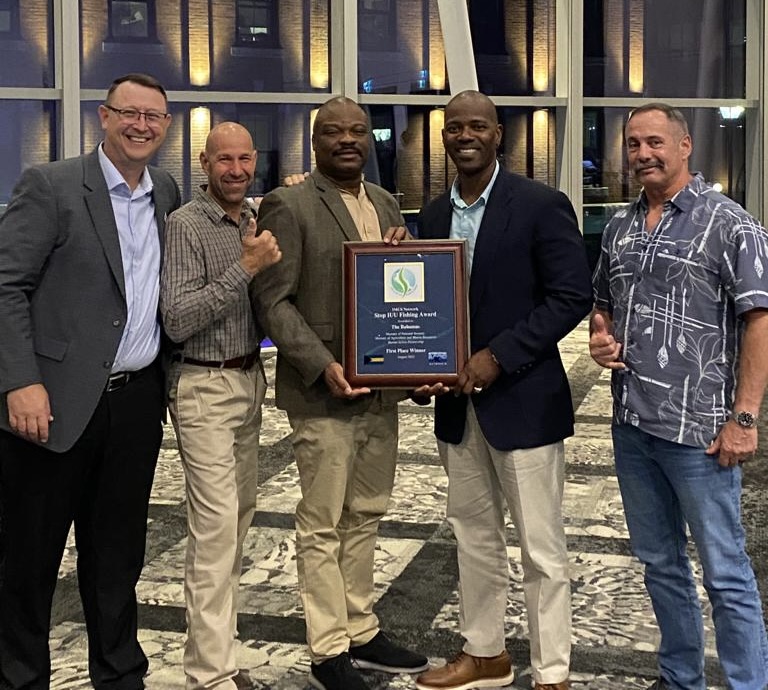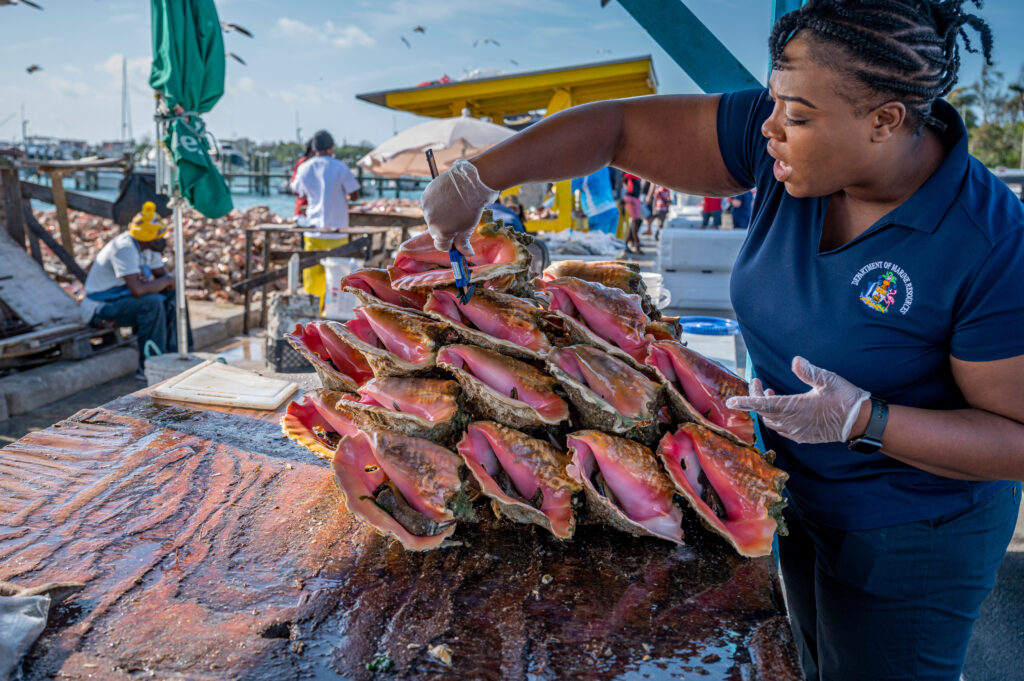WildAid Proud to Partner with The Bahamas, Winner of the Stop IUU Fishing Award
This summer, the IMCS Network will award The Bahamas the 4th Stop IUU Fishing Award as a result of the nation’s successful collaboration with WildAid Marine, The Nature Conservancy, the U.S., Canada, and other agencies committed to ending illegal, unreported, and unregulated fishing, aka IUU fishing.The award will be given at the 7th Global Fisheries Enforcement Training Workshop on August 3, 2023, in Halifax, Nova Scotia.
Stop IUU Fishing Award
The Stop IUU Fishing Award is given by the IMCS Network—an informal, voluntary organization that supports members from national, regional, and international fisheries agencies and organizations. The Network also includes observers from intergovernmental organizations, non-governmental organizations, and academic institutions that support the objective of the Network and strengthen and enhance responses to IUU fishing and focus collective Monitor, Control, Surveillance (MCS) efforts.
According to the IMCS Network, IUU fishing is a global issue that disrupts marine conservation and hinders sustainable fisheries. Because IUU fishing is frequently linked to transnational crime —and human rights abuses—the scale of activity can be immense. To successfully deter illegal fishing, it’s important to have a system of coordination, particularly when it comes to cross-border crimes, and to develop an enforcement strategy that is more sophisticated and more complex than in the past.
The award, then, is the recognition of demonstrated success, innovation, and impact on deterring IUU fishing and is given to a member of the Network that supports its global MCS community. For award eligibility, agencies and organizations were invited to submit entries to be reviewed and evaluated by an expert panel.
This year, WildAid Marine entered a submission for The Bahamas on behalf of the Marine Action Partnership (MAP), a recently-established formal collaboration between The Bahamas, WildAid, The Nature Conservancy, and other governmental and non-governmental organizations as part of an organized effort to better respond to IUU fishing in The Bahamas.

Ending IUU Fishing in The Bahamas
It’s estimated that nearly 1/3 of all fishing catch in The Bahamas is considered IUU fishing, harming marine ecosystems, fisheries, and the local economy, especially impacting spiny lobster and queen conch populations.
In response to the difficulties of monitoring 242,000 square miles of ocean and islands in the Caribbean’s largest Exclusive Economic Zone, MAP was formed and the group invited WildAid to conduct a comprehensive assessment in collaboration with The Nature Conservancy. Led by The Bahama’s Department of Marine Resources, MAP is a multi-year initiative that enhances marine patrol and investigative and operational coordination among national and international law enforcement partners.
Since its inception, MAP successfully achieved several goals, including:
- the approval of a 5-year action plan
- the establishment of The Bahamas Wildlife Enforcement Network (BahWEN), a focused fish and wildlife law enforcement entity
- the creation of training forum through BahWEN, with WildAid leading advanced training on investigating illegal fish and wildlife harvesting and trafficking
- coordination with Fisheries and Oceans Canada, AI2, and WildAid to secure over $1M (USD) of remote surveillance support
- increased collaboration between law enforcement, fishing communities, protected area managers, and other stakeholders
- a public awareness campaign with funding secured by WildAid for an iLCP-produced video that reached 91,000 viewers over the course of four days.
Bahamian fishers already report a revitalization of fish stocks in the northern and southern waters of The Bahamas due to increased patrols enabled through collaboration with the U.S. law enforcement.

WildAid’s Continued Protection of Marine Species in The Bahamas
As a MAP partner, WildAid conducted advanced training on investigating illegal fish and wildlife harvesting and trafficking in The Bahamas.
For the past 15 years, The Bahamas has demonstrated its leadership in marine conservation through legislation outlawing species-specific catch in its waters. In 2011, the country created the first shark sanctuary in the Atlantic Ocean, prohibiting all commercial shark fishing in its 630,000 km2 marine area for the protection of more than 40 shark species, including the critically-endangered great hammerhead shark.
In 2013, legislation prohibiting the harvesting, possession, purchase, and sale of sea turtles and their eggs found in Bahamian waters or on any of its hundreds of beaches was enacted, protecting animals such as the endangered green sea turtle, the critically-endangered hawksbill sea turtle, and the vulnerable leatherback sea turtle, all of whom use Bahamian beaches as nesting sites.
Marine resources enforcement is a key part of the successful conservation of these and other species. By partnering with organizations such as WildAid, Bahamian law enforcement agencies are better equipped to reduce illegal fishing and enforce marine conservation legislation that protects species that are essential to The Bahamian waters and economy.
WildAid is encouraged by the success of MAP and will continue to provide support to The Bahamas with data collection, training, mentorship, public awareness, and international government and NGO collaboration to address cross-border fishery crimes. In particular, WildAid plans to work with MAP to establish a universal poaching hotline in further support of its mission of ending illegal trafficking and poaching.